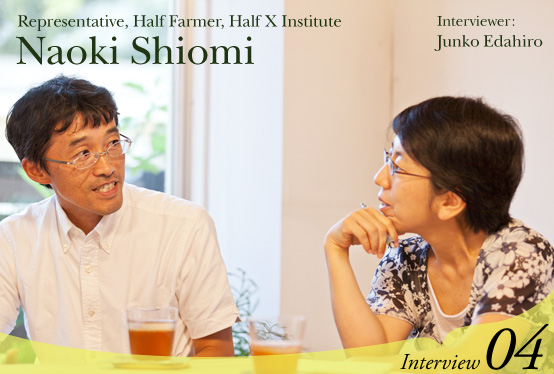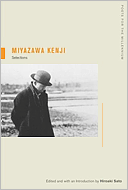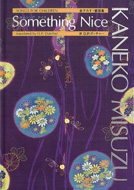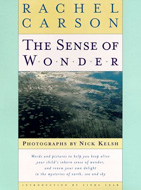- Edahiro:
- The Half Farmer, Half X concept is not the same thing as in the utopian movements we've had so many of in the past, or just about experiencing country life, is it? What would you say if you were asked to describe the difference between being a Half Farmer, Half X and part-time farming?
- Shiomi:
- If the part-time farmer is someone who enjoys volunteering or is active in their own group, or a senior who puts his heart into it and has an opinion as a part-time farmer, to my eyes they are all Half Farmer, Half X. If that person would rather call themselves a part-time farmer that's great, and I don't want to create any boundaries by labeling them as a Half Farmer, Half X.
- Some people are farming on a grand scale as full-time farmers and also involved in urban development. One person I met in northeastern Japan ran a large farm and established an NPO while also running a type of free school, so I wonder if the label "full-time farmer" is big enough to describe everything. But if there is pride in being a full-time farmer, that's fine too.
- In the olden times, farmers were also carpenters, and even warriors picked up the hoe during their spare time.
- Edahiro:
- The word "hyaku-sho" (a term for "farmer" in Japanese, meaning "a hundred names") originally means exactly that, right?
- Shiomi:
-
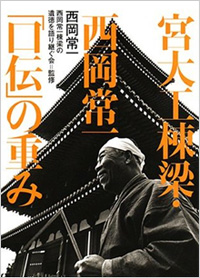
A book by Tsunekazu Nishioka, master temple carpenter
Yes. One example that I like is from a book by a temple carpenter ("miya daiku") from Nara, named Tsunekazu Nishioka, and it tells of this ancient teaching that says, "When a temple carpenter finds time on his hands, he should not do his ordinary work but go out to the field and farm." They used to have farms and rice fields. By touching the soil and plants they could learn about the spirit of the tree, and as they worked in the field, they could contemplate the tasks of their next job. We are in an era today where we tend to keep our schedules quite full, but I think it's good to slow down a bit and have time to think about the future. I thought that this kind of thinking had a lot to teach me. Nishioka's book also mentions the term "half farmer, half craftsman."
Toson Shimazaki, the author who wrote books like "Yoake Mae" (Before Dawn) also uses the term "half farmer, half artist" in his novel written in 1926, "Arashi"(Storm). The main character's father says to his children aspiring to become painters, "It's okay to be half farmer, half painter, you know."
If we think about it, even in Shimazaki's time, the Japanese actually embraced this concept and may have had different names for it.
- Edahiro:
- That's interesting.
- Edahiro:
- If you go into farming with the intention of raising the food self-sufficiency level, I think it is fine to be involved partially in farming, but the X-factor is still very important as well. Please talk a little about that.
- Shiomi:
- I feel that the time spent on farming and time spent on X are closely linked to each other. For example, I often get inspiration while cutting grass in the field so I keep a pencil and paper in my pocket to write down those ideas. When larks are flying in the sky, cicadas and frogs and snakes are all around and the wind is blowing, it's very easy to have an inspiring thought, like an idea for a project, or an insight for an essay.
- I feel that it's especially important that, through farming, it's possible to overcome the ideology of humans as the center of the universe. In other words, through farming, we can learn not to control nature based on the human ego but learn to be encompassed by nature, to be close to nature, to abide by the laws of nature, to learn from nature.
- There is another thing to learn from nature, and that is creativity. I see a lot of aesthetic sense in the villagers. For example, they might say, "It doesn't look nice the way the grass is growing all over like that." There is also great beauty in the finish on earthen walls and the design of the small dikes separating rice paddies.
- And there is sensitivity. The "sense of wonder" introduced by Rachel Carlson is something you can learn immediately through farming as well.
- This year I did a terrible thing when I killed over 20 frogs while mowing the field. But I think it would be even more terrible if I hadn't felt badly about killing those frogs, and I wonder what people like Kenji Miyazawa (poet and writer, 1896-1933, Buddhist, vegetarian, social activist) or Misuzu Kaneko (poet and songwriter, 1903-1930, writing often about fishing and the sea) would have felt in the same situation. I feel this all has an effect on my X, creating a very positive cycle.
-
More and more business entrepreneurs are relocating to Chiba (a prefecture near Tokyo, located on a peninsula with cities, low mountains, beaches, and rural areas), and I think that is a very good sign and that they are heading in the right direction. My hope is that more and more people will become half-farmers/half-entrepreneurs.
- Edahiro:
- Many people today think, "I can't go on like this." What are your views on the meaning of not only farming but on finding their X-factor?
- Shiomi:
- The word, "mottainai" (wastefulness is bad) is now used internationally when discussing environmental issues, but there are three more "mottainais" in Japan, and they are: "not using your natural talent," "not using local resources," and "not joining with others (not collaborating with others in different ways." There are many "mottainai" people out there who have not been utilizing their skills and potentials, and there are many collaborations waiting to happen though new encounters.
- I think finding the X-factor is not easy and what I say to those people who haven't yet found it is, "Don't be caught up on finding your X-factor, because there are X's for supporting others." There are times when helping other people or family members fulfills your X-factor too. I think a lot of people think that X means your own thing, but I think supporting someone else is also a beautiful form of X.
- Edahiro:
- I think many people feel that they have been helped by the concept of Half Farmer, Half X. They might say, "I don't know what I'm good at or have not found my X yet, but if it's Half Farmer, Half X, I could do it."
- Among those people, I think some start by becoming a half-farmer and then exploring the Half X. Then conversely, there is another type that might say, "I want to work at this company and continue to do what I like, but it doesn't pay me well enough so I want to grow my own food." They might go into it from Half X to Half Farmer. What are your thoughts on this?
- Shiomi:
-
Both paths are good. The good thing about Half Farmer, Half X is that adding something very simple about growing, like putting a planter on your balcony, will enrich you and make you feel good. There are two sides to the X. Some people will shift towards X and challenge farming a little bit, and others may be more extreme and actually quit their jobs.
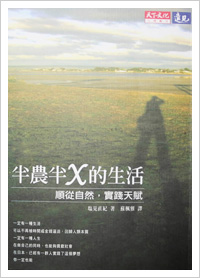
"Lifestyle of Half Farmer and Half X" (Chinese edition) by Naoki Shiomi, 2006
I went to Taiwan last year and met a person who told me, "I quit my job as a university professor and became the head of my neighbourhood community center," which really surprised me. The title of my book in Taiwanese translates to: "Following Nature and Practicing Your True Calling." This a very clear message articulated by eight Chinese characters.
If our direction in life could be this simple, I feel that all our confusion would disappear. Things are actually very simple, but I think we complicate them.


